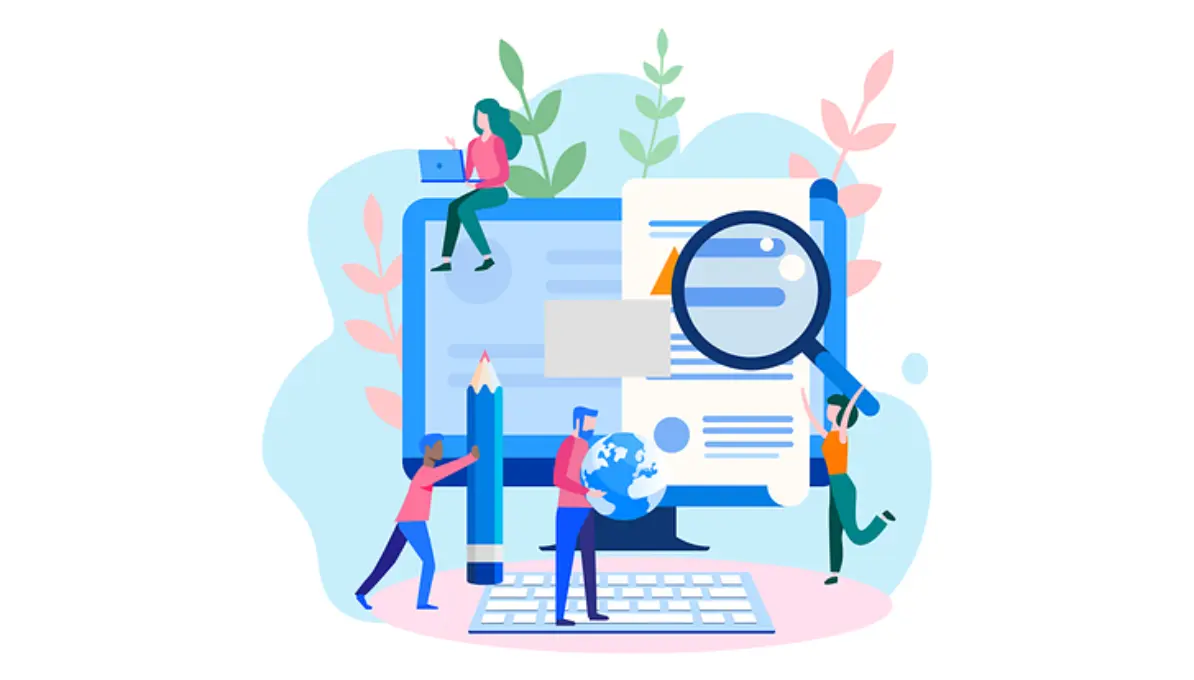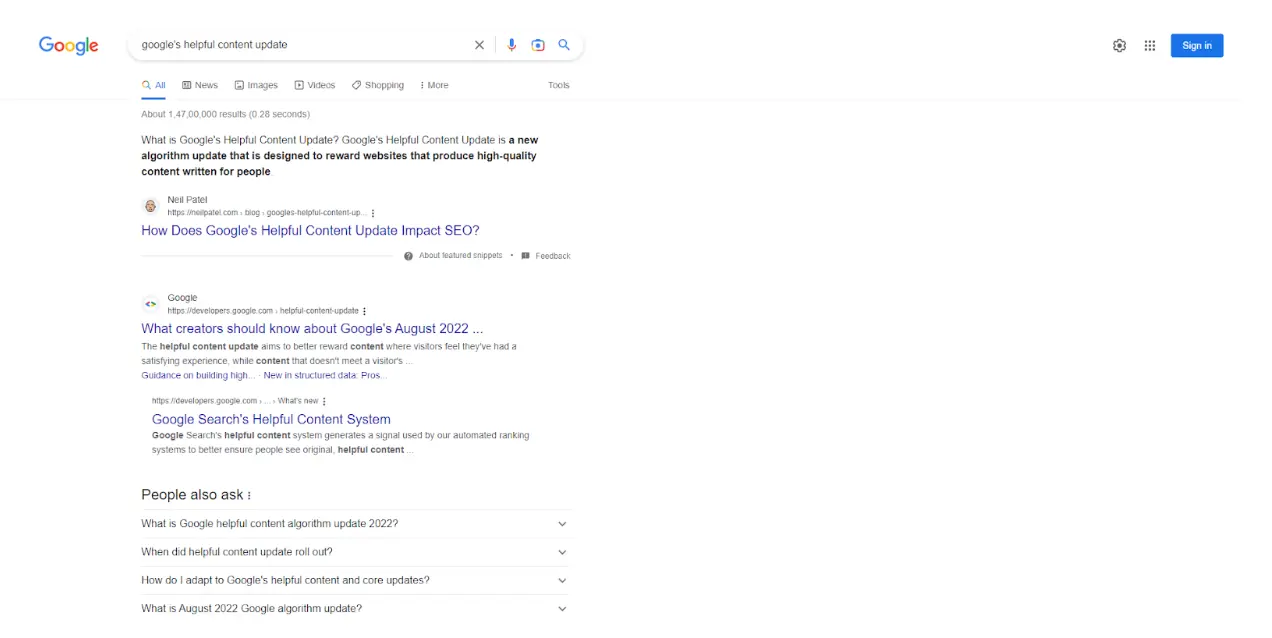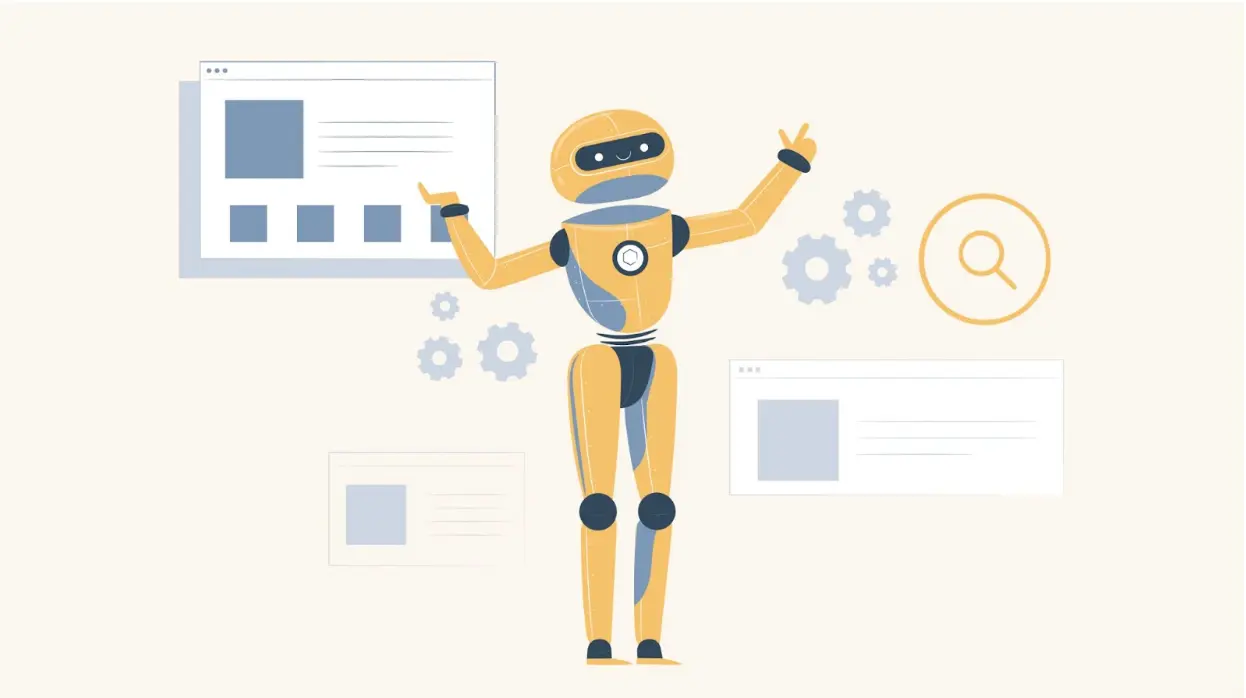Creating high-quality content has become imperative. Websites with unsatisfactory or unhelpful content are at risk.
You might experience a drop in traffic and rankings if you write content to rank on Google while not considering user experience. Google Helpful Content Update is a site-wide update.
Depending on how you handle the update and how you update your content over time, it can either drastically improve the engagement with your website or reduce it.
With its new helpful content update, Google aims to help users locate "high-quality content" by identifying content that "appears to have been created primarily for search engine rankings as opposed to assist or inform."
When Was Google Helpful Content Update Released?
Google's Helpful Content update was released on August 25, 2022. There are plans to roll out this update in other languages in the future after a two-week rollout of the English ranking algorithm update.
Launching and implementing Google Search ranking updates is an easy way for website owners to stay on top of the latest Search ranking.
How Does Google's Helpful Content Update Work?
The Helpful Content Update rewards businesses with a satisfying website user experience. And the content written for search engines focused on generating favorable rankings utilizing keyword stuffing must improve its visibility.
Google's Helpful Content Update implementation is vital. It is a weighted algorithm that is applied to the entire site.
The machine learning algorithm may flag unhelpful content on a website with a classifier, affecting the site's overall visibility.
There is a more pronounced effect on sites with high proportions of unhelpful content versus sites with high proportions of helpful content.
As affected sites need to refresh their existing content, to recover and gaining visibility could take months.
Google wants to provide more helpful content to assist users and reward better content. Remove unhelpful content from your website and prove the ranking algorithm to regain search engine visibility.
Consider these months as a probation period. During recovery, make sure your content is user-friendly.
Three Ways to Prepare for the Google Update
Following are three ways to prepare for Google's new helpful content update beforehand:
1. Identify what your audience wants
Why is this pertinent?
- As many writers know, offering value to your audience and identifying the "need" for a particular type of content is critical.
- For instance, selling an online SEO course you designed may not benefit an audience merely searching for "What is SEO?"
- How an Etsy shop selling pre-made stickers doesn’t help an audience looking for ways to design their stickers online.
Identify your audience's needs and provide them with solutions that meet their needs.
- Can you provide your target audience with relevant content if they come directly to you?
-
Newly launched, old sites must understand their target audience deeply instead of focusing solely on ranking.
2. Write transparent content
- Google advises against clickbait. Refrain from sabotaging your readers' expectations by adding irrelevant content or stuffing keywords. Stuffing keywords can result in awkward content, thus reducing rankings.
- The other crucial point to remember is to ensure that you only provide relevant content to your existing audience. It should only consider trends that resonate with your current audience.
3. Focus on producing value-added content

- You can flex your skills and demonstrate your real expertise here. People will enjoy writing more if they learn something from it.
- Readers should feel satisfied after reading your content.
- There's no need to feel stressed or nervous about the update to search engines coming your way if you work with experienced writers.
Create articles that rank
- Avoid producing many articles to avoid sacrificing quality, readability, and substance for ranking number one.
- Nurture your existing audience while inviting new viewers (and keeping them coming back)!
- Post-update, you should see increased search traffic if you are already producing high-quality content.
Factors to Consider for the Google Helpful Content Update
- The company has provided tips for navigating the upcoming changes as part of an effort to assist.
- For creating high-quality sites and content, Google also offers guidelines to content creators, marketers, and publishers.
4 Things to Keep in Mind About the Google Helpful Content Update
1. Focus on your main topic
- With this update, Google may be urging people to specialize in their areas of expertise. Sometimes publishing articles outside your niche is crucial to create content for search engines.
- If you create content on the same, your website user will not find the content helpful. The content will only be useful for people who are interested in skincare.
- For example, imagine having a recipe website and seeing a high-volume skin care keyword that you can monetize.
- What is the purpose of the content besides attracting search engine visitors?
- Is it just because you see things trending that you are writing about them rather than because you would otherwise write about them for your existing audience?
- Is your reason for entering some niche topic area based on your hopes of gaining traffic from search engines?
2. Ensure you have hands-on experience
- According to Google, people shouldn't write about things they don't know personally. Writing content for search engines may require the content writer to write about products and services they've never used.
- The author then places an affiliate link to earn massive commissions from the product; however, value needs to be improved because the author needs to be more educated on the topic.
- Instead, provide original photos and insights if you know something about the product, service, or location on which you’re writing.
- It’s where AI platforms like ChatGPT can be of great help. If you are wondering how to use ChatGPT, writers can use it as an assistant tool to get a basic idea of the topic.
- Google suggests asking yourself: Does most of your writing consist of summarizing others' ideas and not adding your own?
3. Answer searchers' questions promptly

- Google recommends that people consume content that teaches them something or aids them in accomplishing a task and provides value.
- When creating content for search engines, there is often a lot of wasted writing. People should be able to find answers to their questions or resolve their concerns when you write content for them.
- Jobber’s resource on getting an Electrician License answers readers’ questions early on. Within the first few sections, you learn what an electrician license is, what categories there are if you can work without a license, and how to get one.
- While this page is comprehensive, you don’t have to scroll far to answer your most pressing questions.
- Are your readers compelled to search for more information after reading your content?
- Do you use a specific word count because Google prefers it? As there is no such word count.
4. Reader experience should not be neglected
- You can meet the above criteria, and they must deliver a satisfactory experience. This advice from Google encourages people to think about how the reader will experience the piece of content.
- For example, a detailed first-hand product review with videos or images will have a different effect.
- While searchers may appreciate textual content, a visual demonstration of the product would make it more engaging. Provide searchers with what they want; keep them from wanting more.
Why Is Google Updating Its Ranking Algorithm?
Social media and other traffic avenues have become increasingly popular places for search engine-first content, also called search-engine-optimized (SEO) content.
Web search results tend to rank high due to stuffed keywords, but these web pages could be more helpful to searchers.
This algorithm revolutionizes the process of content creation and elevates more useful human-designed sites. As part of Google's effort, the company aims to "reduce low-quality content and make it easier for people in Search to find useful and authentic content."
SEOMagnifier helps content creators by providing tools to easily rewrite and improve existing content to better align with Google's helpful content guidelines.
The result is that human-centric content will take priority over search engine-specific content.
Significant changes in Google ranking and visibility will likely occur over the next few days. In the coming months, follow Google's recommendations and make the necessary changes.
3 Ways to Protect Your Website After This Google Update
Even though a Helpful Content Update will affect the entire site, it will not cause as much trouble as a manual update. Follow these steps to manage your site if your ranking drops:
1. Get back to basics
- The target audience plays a crucial role in deciding what content to post. You must be creating content for the right audience.
- Creating a persona will help you create apt content and scale your website to the top.
- Avoiding stuffed keywords and focusing on providing better insights will help Google identify your content as authoritative and help you rank your website again.
- Use AI sparingly
- Recently, AI has become increasingly popular for quickly producing large quantities of content. You should reconsider whether you want AI writing tools to write your content.
- Many AI tools, including SEO Magnifier AI Paraphraser Tool, are artificial intelligence-powered paraphrasing tools designed to help users generate new, unique, and high-quality content for their websites and other online platforms.
Optimizing your content with human editing makes a significant difference. Try using different social media analytics tools when creating content, including actual data, competitors, or social media specialists.
2. Put your unique value into the equation
-
Google prioritizes content created by individuals with extensive knowledge of the field with first-hand experiences. Your readers will appreciate this.
-
Focus on your website or blog visitors to know what you have to say about the subject.
-
There is a great deal of information available online about the same topic. Your expertise, experiences, real-world examples, and data are all critical.
-
Is there a way in which your website will stand out from those of your competitors?
-
Generic content should not be distributed in bulk
-
Make sure your content provides meaningful insights and answers to satisfy your reader. It requires planning and sufficient time. Think about adding value to the topic before looking for keywords to rank for on SERPs (Search Engine Results Pages).
-
Creating low-quality, generic, and unplanned content might help you with quantity, but your quality would suffer. In other words, Google tells us, "Don't try to please me; satisfy your users." We should never forget that we are writing for another human to read. As the Helpful Content Updates remind us, we should always provide valuable content to our audiences.
3. Identify your audience before you write
- With the Helpful Content Update, Google emphasizes that you cannot be a jack of all trades on your website. Websites that publish articles about technology, health, CBD, finance, and other topics generate views often. Guest posts are not monetized on such websites, so Google opposes them.
- Thanks to the Google update, some websites will no longer dominate Google's search results. The update should not affect quality content writing services or websites. However, aggregated and repurposed content may make it difficult for sites to appear at the top of search engines.
Conclusion
It will take two weeks for Google to roll out its helpful content update. You should assess the update's impact once it has been completed. English searches will be affected worldwide and will add other languages in the future.
It won't be only this time that Google releases a helpful content update. In Google's original announcement, the company said it would refine how it detects unhelpful content.
FAQs
How does the Google helpful content update (HCU) work?
Google's Helpful Content Update encourages creators to produce high-quality content to answer user queries rather than solely focus on the optimization of search engines.
SEO experts are comparing the latest update with previous algorithm updates like Panda and Penguin, which forced them to rethink their strategies.
How long has it been since Google last updated its software?
May 2022 marked the implementation of Google's 'broad core update.' Before the Helpful Content Update in August 2022, it was Google's last major update.
What is the frequency of Google's updates?
In a typical year, Google releases several algorithm updates. Google made a total of 4,500 updates to Google Search in 2020.
According to Google, in 2019, it made 3,200 changes to Google Search. There are 5-6 major updates that Google releases every year. Over the year, we could see more updates.



